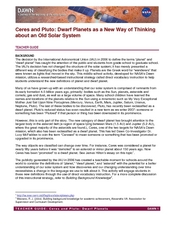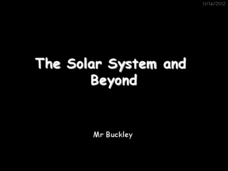University of Colorado
Looking Inside Planets
All of the gas giant's atmospheres consist of hydrogen and helium, the same gases that make up all stars. The third in a series of 22, the activity challenges pupils to make scale models of the interiors of planets in order to...
Curated OER
Using a Graphic Organizer to Research a Question
Is Pluto still a planet? Using this popular question, kids are introduced to graphic organizers as a writing tool. As a class, they watch a demonstration on how to use them and work together with a partner to research whether Pluto is a...
Education World
Every Day Edit - Pluto, the Dwarf Planet
In this everyday editing worksheet, students correct grammatical mistakes in a short paragraph about the planet Pluto. The errors range from punctuation, capitalization, spelling, and grammar.
Curated OER
Discovering Planet X
Students investigate the movements of the planet Pluto. Students participate in a hands-on activity to record data similar to the movements of the planet Pluto. Students compare their data to that found on a website.
University of Colorado
Looking Inside Planets
Researchers use scientific data to understand what is inside each of the planets. The first in a series of six, this instructional activity builds off of that concept by having pupils use a data table to create their own scale models of...
Curated OER
The Outer Planets
In this outer planets activity, students determine if 15 statements about Neptune, Pluto, Saturn and Uranus are true or false. If they are false, students change the italicized words in the sentences to make the statements true.
Curated OER
Ceres and Pluto: Dwarf Planets as a New Way of Thinking about an Old Solar System
Learners examine the new categories of planets and how planets were reclassified. In this solar system lesson students complete activities using Venn diagrams and images of planets.
Laboratory for Atmospheric and Space Physics
Orbit Simulator
Researchers think they have evidence of a new planet deep in our solar system that is the size of Neptune and orbits the sun far beyond Pluto. The orbit simulator shows the orbits of our well-known planets, as well as Pluto and the comet...
Curated OER
The Solar System and Beyond
Survey the solar system by viewing this PowerPoint. Amateur astronomers discover that gravity is responsible for Earth's orbit around the sun and the moon's orbit around Earth. They explore the moon's phases and Earth's seasons. This...
media.yurisnight.net
Science Lesson Plan: Our Solar System: I Wonder?
Ever wonder why Pluto isn't considered a planet? Or how large the Earth is compared to the other inner planets? Explore the universe with a series of projects that simulate different aspects of our solar system. The activities require...
Curated OER
The Webb Space Telescope: Detecting Dwarf Planets
In this detecting dwarf planets worksheet, high schoolers read about the Webb Space Telescope that will be launched in 2014 to detect dwarf planets using an infrared telescope. Students solve 3 problems and create a graph for each using...
Curated OER
Exploring Dwarf Planet Eris
In this planet Eris worksheet, students read about the discovery of this dwarf planet and its characteristics. Students answer 3 questions about the planets, the classification of planets and the definition of planets. Students define 7...
Curated OER
Could the Solar System have Ten Planets?
Students react to statements about the solar system, then read a news article about a recently discovered object that could be another planet. In this space science and current events lesson, the teacher introduces the lesson with a...
Curated OER
Solar System and Planets
Students identify the main components of the solar system. For this earth science lesson, students order the planets according to their distances from the Sun. They differentiate planets from dwarf planets.
Curated OER
Pluto: February 18, 1930
In this writing prompt worksheet, students learn the date February 18, 1930 as the date Pluto was discovered. Students then answer the following prompt: 'What is your personal opinion about the scientist no longer considering Pluto to be...
Curated OER
Uranus, Neptune, and Pluto
In this planets instructional activity, students read information about Uranus, Neptune, and Pluto and then complete 18 multiple choice, 4 true or false, and 2 fill in the blank questions.
Curated OER
Out of this world! 2
In this solar system worksheet, students fill in the blank to sentences that refer to the solar system. Students fill in 15 blanks with planet names.
University of Colorado
Phases of Charon
Charon, the largest of Pluto's moons, was discovered in 1978. Lesson is a walk through of how to solve for the phases of Charon. It uses two different points on Pluto and takes into account the tilt of the pole, the rotational axis, and...
Curated OER
Is There a Tenth Planet?
For this planets worksheet, students read about how our solar system's planets were discovered and how scientist believe there might be a tenth planet. After reading, students complete 4 short answer questions.
Curated OER
Life on Other Planets
For this planets worksheet, students put the planets in order, complete sentences about planets, read text about planets, match sentences, and more. Students complete 7 tasks total.
Curated OER
Out of This World 1
In this planets research skills worksheet, learners use their research skills to fill in the blanks in 15 sentences regarding the planets.
Curated OER
Scavenger Hunt: Who am I?
In this space science activity, students use the sites listed on the Solar System and Planets page of the Kid Zone to locate the names of the people credited with each discovery. They identify and name 26 different scientists who made...
Curated OER
The Solar System
In this solar system instructional activity, students complete a word puzzle by determining the terms associated with the 10 statements about the planets.
Curated OER
Astronomy
Students complete a unit of lessons on our solar system, its stars, and astronomers. They record information in a space journal, design constellations, define key vocabulary, observe the phases of the moon, and create a group planet...

























